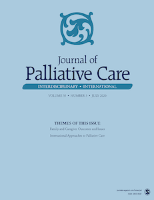
JOURNAL OF PALLIATIVE CARE
Scope & Guideline
Championing the Art and Science of Palliative Care
Introduction
Aims and Scopes
- Holistic Patient Care:
The journal emphasizes comprehensive care approaches that address the physical, emotional, and spiritual needs of patients facing life-limiting illnesses. - Interdisciplinary Collaboration:
Research often highlights the importance of teamwork among healthcare providers, including physicians, nurses, social workers, and other professionals in delivering effective palliative care. - Cultural Competence in Palliative Care:
The journal explores the impact of cultural, social, and economic factors on palliative care delivery, aiming to improve access and quality across diverse populations. - Innovative Therapeutic Approaches:
Research includes novel interventions such as music therapy, mindfulness, and other holistic methods to enhance symptom management and patient well-being. - Education and Training:
The journal publishes studies on educational programs and competencies necessary for healthcare professionals to effectively deliver palliative care. - Policy and System-Level Interventions:
Articles often focus on healthcare policies, guidelines, and frameworks that support the integration and delivery of palliative care services.
Trending and Emerging
- Advance Care Planning (ACP):
There is a growing focus on advance care planning, with studies examining its impact on patient outcomes, healthcare utilization, and family satisfaction, reflecting an increased recognition of its importance in palliative care. - Patient and Family Experiences:
Research is increasingly centered on understanding the experiences and needs of patients and their families, emphasizing the importance of patient-centered care and shared decision-making. - Integration of Technology in Care Delivery:
Emerging themes include the use of technology, such as telehealth and electronic patient-reported outcomes, to enhance access to palliative care services and improve communication among care teams. - Cultural and Social Determinants of Health:
There is a rising interest in exploring how cultural, social, and economic factors influence palliative care access and quality, leading to a more nuanced understanding of disparities in care. - Psychosocial and Emotional Aspects of Care:
Research increasingly addresses the psychosocial dimensions of palliative care, including mental health support for patients and families, reflecting a holistic view of patient well-being.
Declining or Waning
- Traditional Medical Approaches:
There is a noticeable decrease in the emphasis on conventional medical treatments without consideration for palliative approaches, indicating a shift towards more integrated care models. - Single-Discipline Perspectives:
Research focusing solely on the perspectives of individual healthcare providers is waning, as interdisciplinary approaches gain traction in palliative care discussions. - Generalized Pain Management Strategies:
There seems to be a reduction in studies solely addressing generic pain management techniques, with a growing focus on personalized and holistic pain management strategies. - End-of-Life Care in Acute Settings:
The frequency of studies addressing end-of-life care strictly within acute hospital settings is diminishing, as researchers increasingly explore community and home-based palliative care models. - Quantitative Studies without Qualitative Insights:
There is a trend away from purely quantitative studies that do not incorporate qualitative insights from patients and families, reflecting a broader interest in understanding lived experiences.
Similar Journals
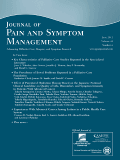
JOURNAL OF PAIN AND SYMPTOM MANAGEMENT
Innovating Solutions for Pain and Symptom ChallengesThe Journal of Pain and Symptom Management, published by Elsevier Science Inc, stands as a seminal platform in the fields of Anesthesiology, Pain Medicine, Neurology, and Nursing since its inception in 1986. With an impressive Q1 ranking in multiple categories, this journal is recognized for its rigorous peer-reviewed articles and high-impact research, evidenced by its rankings in the 93rd percentile in Medicine - Anesthesiology and Pain Medicine, and the 97th percentile in Nursing. The journal aims to advance the understanding and management of pain and associated symptoms through innovative research, clinical practice guidelines, and systematic reviews. Researchers and professionals alike benefit from its commitment to disseminating cutting-edge findings that address the complexities of pain management and improve patient care. The journal is accessible in print and electronically, ensuring a broad reach within the academic community.
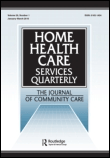
HOME HEALTH CARE SERVICES QUARTERLY
Fostering Dialogue for Better Health OutcomesHOME HEALTH CARE SERVICES QUARTERLY, an esteemed publication by Taylor & Francis Ltd, has been a cornerstone of scholarly discourse in the fields of community and home care since its inception in 1979. With ISSN 0162-1424 and E-ISSN 1545-0856, this quarterly journal promotes rigorous research and innovative practices in home health care services, significantly impacting health policy and public health discussions. The journal enjoys a respectable Impact Factor, reflecting its contributions to the field, and currently ranks Q2 in Community and Home Care, along with Q3 status in both Health Policy and Public Health. Researchers, professionals, and students alike can benefit from the diverse range of articles that address practical challenges and emerging trends within the home health care industry. Although not an open-access journal, it continues to provide a vital platform for advancing knowledge and disseminating best practices essential for improving health outcomes. As it embarks on its journey towards 2024, it remains committed to fostering an inclusive dialogue that shapes the future of home health care.

Journal of Cancer Policy
Bridging the gap between research and cancer management.Journal of Cancer Policy is an esteemed publication devoted to the critical intersection of health policy and oncology. Published by Elsevier Sci Ltd in the United Kingdom, this journal has been a pivotal platform since its inception in 2013, contributing to the field's discourse on cancer management and policy-making strategies. With an impressive Q2 ranking in both the Health Policy and Oncology categories for 2023, it underscores its significance in shaping policy frameworks that address the complexities of cancer care. The journal is listed in Scopus with a respectable rank of #177 in Health Policy and #261 in Oncology, indicating its broad reach and impactful contributions to research and scholarly discussions. While the journal operates under a subscription model, it aims to provide readers with high-quality research that can influence health decisions and policy formation. As a vital resource for researchers, healthcare professionals, and students alike, the Journal of Cancer Policy plays a fundamental role in advancing the understanding of how policies can improve cancer outcomes and healthcare systems.
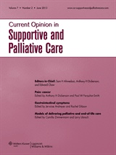
Current Opinion in Supportive and Palliative Care
Navigating the complexities of critical care with expertise.Current Opinion in Supportive and Palliative Care, an esteemed journal published by Lippincott Williams & Wilkins, provides a vital platform for the dissemination of contemporary research and expert perspectives in the fields of supportive and palliative care. As part of the medical community's growing focus on critical care and oncology, this journal has earned its place in the Q2 category across multiple rankings, reflecting its influence and significance in advancing knowledge and practices. With its ISSN 1751-4258 and E-ISSN 1751-4266, it covers literature from 2007 to 2024, making it a reliable resource for the latest developments. While it does not offer open access, the journal ensures careful curating of high-quality articles, fostering a deeper understanding of complex care needs. Researchers, clinicians, and students alike will benefit from the journal's insights, exploring innovative strategies and multidisciplinary approaches to improve patient outcomes in critical situations. The commitment to such a crucial area of healthcare underscores the importance of this publication in shaping future practices and policies.

Medycyna Paliatywna-Palliative Medicine
Fostering Collaboration for Enhanced Patient CareMedycyna Paliatywna-Palliative Medicine is a vital academic journal dedicated to advancing the field of palliative care, published by TERMEDIA PUBLISHING HOUSE LTD. With its ISSN 2081-0016 and E-ISSN 2081-2833, this journal serves as a reputable source of high-quality research and compelling insights for scholars, healthcare professionals, and students committed to improving the quality of life for patients with serious illnesses. Although it does not currently offer Open Access, Medycyna Paliatywna ensures that articles published within its pages undergo rigorous peer review, reflecting the highest standards in medical research. The journal aims to contribute to the ongoing dialogue in palliative medicine, encouraging innovative practices, sharing evidence-based strategies, and fostering collaboration among healthcare providers. By disseminating important findings and clinical insights, Medycyna Paliatywna plays a crucial role in shaping the future direction of palliative care, making it an essential resource for anyone involved in this critical field.

SUPPORTIVE CARE IN CANCER
Fostering interdisciplinary collaboration in supportive care.SUPPORTIVE CARE IN CANCER is a premier academic journal published by Springer, dedicated to advancing the understanding and management of supportive care for cancer patients. With a notable impact factor, the journal is recognized for its contribution to the fields of Oncology, Rehabilitation, and Nursing, achieving impressive rankings in Scopus, including Q1 for Oncology Nursing and Rehabilitation, and Q2 for general Oncology. Founded in 1993 and looking towards a promising future until 2024, it serves as a vital resource for researchers, professionals, and students engaged in these critical areas of healthcare. Although not an Open Access journal, its rigorous peer-reviewed articles provide valuable insights into innovative practices and evidence-based strategies that enhance patient quality of life during and after treatment. By bridging the gap between research and clinical practice, SUPPORTIVE CARE IN CANCER significantly influences patient outcomes and fosters interdisciplinary collaboration in patient support.
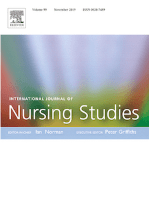
INTERNATIONAL JOURNAL OF NURSING STUDIES
Advancing nursing knowledge for a healthier tomorrow.INTERNATIONAL JOURNAL OF NURSING STUDIES, published by PERGAMON-ELSEVIER SCIENCE LTD, stands as a leading journal in the field of nursing, holding a remarkable impact in the academic community with its prestigious Q1 ranking in Nursing (miscellaneous) and a commendable position in the 99th percentile of General Nursing according to Scopus rankings. Since its inception in 1963, the journal has consistently aimed to foster the dissemination of significant research, innovative practices, and comprehensive reviews relevant to nursing and healthcare disciplines. With a commitment to high-quality, peer-reviewed content, it serves as an invaluable resource for researchers, healthcare professionals, and students alike, seeking to advance knowledge and improve patient care outcomes. While it is not an open-access journal, the impactful research published within its pages is vital for the development of nursing science globally, making it a cornerstone of current nursing scholarship.
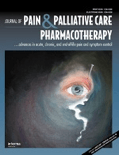
JOURNAL OF PAIN & PALLIATIVE CARE PHARMACOTHERAPY
Elevating Standards in Pain and Palliative Care Pharmacotherapy.JOURNAL OF PAIN & PALLIATIVE CARE PHARMACOTHERAPY, published by Taylor & Francis Inc, is a vital resource for professionals in the fields of anesthesiology, pain medicine, and pharmacology. With an ISSN of 1536-0288 and an E-ISSN of 1536-0539, this esteemed journal has been providing a platform for innovative research and critical reviews since its inception in 2002, and it will continue to contribute to scientific discourse until 2024. Holding a Q2 ranking in Anesthesiology and Pain Medicine and a Q3 ranking in Medical Pharmacology, the journal is positioned to deliver high-impact articles that explore advancements in pain management and palliative care strategies. While not an Open Access journal, it offers significant subscription-based access to its curated content, ensuring that researchers and practitioners have the opportunity to stay updated on the latest trends and findings in pain therapy. Furthermore, with its Scopus rankings reflecting ongoing relevance and a robust academic community, this journal is essential for those aiming to deepen their understanding of pain management pharmacotherapy.
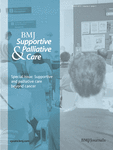
BMJ Supportive & Palliative Care
Championing excellence in palliative research.BMJ Supportive & Palliative Care is a leading academic journal dedicated to advancing the field of supportive and palliative care, published by the esteemed BMJ PUBLISHING GROUP in the United Kingdom. With an ISSN of 2045-435X and an E-ISSN of 2045-4368, this journal showcases high-quality, peer-reviewed articles that cater to a diverse audience, including healthcare professionals, researchers, and students. Notably, it holds a commendable impact factor, reflecting its credibility and influence within the academic community. As of 2023, the journal ranks in the top quartile (Q1) for Medical and Surgical Nursing and holds prestigious positions in the Q2 category for Medicine (miscellaneous) and Oncology (nursing), demonstrating its significance in multiple disciplines. Research published in this journal aims to enhance patient-centered care practices and improve health outcomes, making it an invaluable resource for innovative studies and discussions in the field. With a commitment to open access principles, BMJ Supportive & Palliative Care serves as a pivotal platform for disseminating knowledge and supporting the ongoing professional development of its readership.
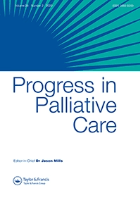
PROGRESS IN PALLIATIVE CARE
Transforming pain management through cutting-edge research.PROGRESS IN PALLIATIVE CARE, published by ROUTLEDGE JOURNALS, TAYLOR & FRANCIS LTD, is a leading academic journal dedicated to advancing the field of palliative care through high-quality research and innovative practices. With an ISSN of 0969-9260 and an E-ISSN of 1743-291X, this journal serves as a critical resource for healthcare professionals, researchers, and students seeking to enhance their understanding of pain management, symptom relief, and holistic care approaches for patients with life-limiting illnesses. Operating without an open access model, the journal is well-regarded in the academic community, holding a Q3 ranking in Medicine (miscellaneous) and a Q2 ranking in Nursing (miscellaneous) as of 2023. Its Scopus ranking places it at rank #51 out of 139 in General Nursing, reflecting its relevance and quality within the field. Covering the period from 2001 to 2024, it aims to foster interdisciplinary dialogue and share vital research findings to improve palliative care practices, ultimately enhancing patient care and outcomes.